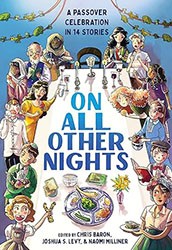In recent years, organizers of marginalized communities have been grappling with “crabs in a bucket mentality”: the tendency of individuals in a vulnerable position to tear each other down, like crabs attempting to climb out of a bucket, rather than hold each other up. Adam Eli’s New Queer Conscience, part personal essay and part call to action, draws on Eli’s experiences as a queer man and as a Jew to tackle this crab mentality in LGBTQIA+ communities. Eli observes that while the global Jewish community is able to rally in support of Jews wronged despite disagreements, the queer community lacks this global consciousness. His solution, based in Jewish principles of pikuach nefesh and mutual responsibility, is for queer people to focus more on commonalities and less on differences.
The emotional core of Eli’s argument is a challenge queer people face in community building, namely, that we are a community built of people who are not born understanding that there is a community to belong to. Whereas most cultures are passed down from generation to generation, queerness is not, and in order to understand previous and subsequent generations, queer individuals must seek out the members of those generations. Even within a single generation, it is not always easy to connect with one another. Yet there is the potential for each lonely, individual queer person to become part of a community made up of individuals from every country in the world. There is no place or time in which queer people do not exist. Eli argues that it is simply up to us to build the connections between generations and across borders that will allow this global community to be more than a dream.
The New Queer Conscience is part of Penguin Random House’s Pocket Change Collective series, pamphlets aimed at teens to educate and inspire action for causes such as immigrant justice, gender awareness, and pollution by plastics. The narrative of moving from loneliness to community is reinforced by the structure of the book, which begins with Eli’s personal recollections of adolescence and ends with a call for compassion that encompasses the whole world. The ten action items he lists are as deceptively simple as religious commandments: support each other, be compassionate toward each other, and forgive each other. Easier said than done, but it must be done.
A literal pocket-sized call to action, Eli’s addition to the series is a good introduction for young people, queer and otherwise, who want to evolve their thinking and reach out to others. As a call for unity across national borders, it must be said that The New Queer Conscience could benefit from a more comprehensive list of worldwide LGBTQIA+ organizations to learn about and support, as the brief list in the appendices is focused on American and Russian organizations. However, as Eli no doubt would urge us to remember, everyone must start somewhere. The first step is to treat others as you would be treated. In the words of Hillel: now go and study.
Sacha Lamb (@sachalamb.author on Instagram) explores gender, sexuality, and disability through historical fiction centering Jewish mythology and folklore. Their debut, When the Angels Left the Old Country, is a Printz Honor book and Stonewall and Sydney Taylor award winner. Their second novel, The Forbidden Book, is a Sydney Taylor Honor book and a Boston Globe Best of the Year pick for 2024. A 2018 Lambda Literary fellow, Sacha has a degree in Library and Information Science from Simmons University. They live in New England with a miniature dachshund mix named Anzu Bean.



